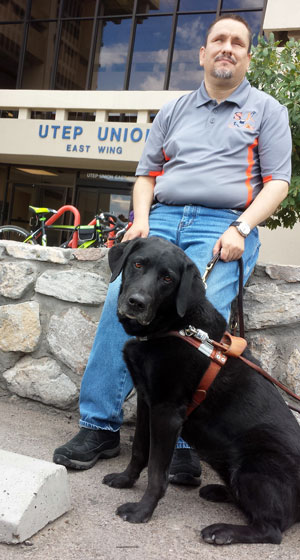Originally published October 17, 2016
By Daniel Perez
UTEP Communications
David Issac Valencia sat on the short concrete wall that fronts the parking lot outside The University of Texas at El Paso’s Union Building East. With him, as always, was Izzie, the black Labrador who had been his eyes since 2008.
Valencia earned his bachelor’s degree in criminal justice with a minor in sociology in 2012. Izzie attended every class on that academic journey and guided him around campus. The graduate returned in fall 2015 to pursue his master’s in rehabilitation counseling with Izzie at his side.

The black lab, who retired Sept. 25, 2016, was among the most well-known service animals on campus. She was replaced by Fonda, a yellow lab. Service animals are highly trained, usually dogs, whose handlers are visually impaired, hard of hearing or deal with less obvious disabilities. Izzie was one of two such animals on campus five years ago. During the fall 2016 semester, there are about 20 of them at UTEP.
Because of the increasing number of Americans with disabilities who use support animals at UTEP and campuses across the country, new, broader policies were instituted during the spring 2016 semester and are overseen by UTEP’s Center for Accommodations and Support Services (CASS).
Valencia said he has had little to complain about regarding Izzie’s treatment on campus. In fact, he considered her his social icebreaker.
“UTEP is very accepting of Izzie,” Valencia said. “In fact, I’ve made a lot of friends since she’s been around. My only issue is that people try to pet her when she’s working. Other than that, we’ve experienced great support.”
Most of the changes to the new policy have to do with definitions, policies and procedures and they have gone pretty smoothly, said Bill Dethlefs, Ph.D., UTEP’s CASS director. He met with campus representatives from University Police, the University Counseling Center and the offices of Residence Life, Environmental Health and Safety, and the Assistant Vice President for Student Support for about six months to update a policy that was last reviewed in 2011. The team’s suggested updates were approved in December 2015.
The U.S. Department of Education estimates that 11 percent of the students in higher education have a disability. Dethlefs believes UTEP’s numbers are higher than the national average and only will go up because of the number of veterans who enroll.
CASS has trained in excess of 1,200 UTEP staff members on how to deal with animals on campus, how to question animal owners and distinguish between support animals and household pets.
There are only two questions University staff members may ask a person with an animal on campus, based on federal law. They may ask if the animal is a service animal required for a disability, and what tasks the animal is trained to perform. The owner is not required to offer proof of a disability to use a service animal, nor does the dog need to wear a vest or other indicator of its role.
Who’s Who
There are two kinds of support animals mentioned in the University’s policy: service animals and assistance animals.
Service animals are mostly dogs of any size or breed trained to perform tasks that will benefit a person with a disability to include physical, sensory, psychiatric, intellectual or other mental disabilities. They also respond to “hidden” disorders such as diabetes, post-traumatic stress disorder (PTSD), seizure disorders or related conditions. Their history dates back to the 1920s when dogs were trained to help military veterans blinded during World War I.
Assistance animals are any animal that brings comfort to individuals, but they must remain in campus housing. They are not allowed the same level of access as service animals. Students who need an assistance animal should contact the CASS office. These animals come in all shapes and sizes from dogs to cats to hamsters. The assistance animal review must be scheduled 30 days before move-in.
In the UTEP housing application, applicants are asked if they will require Americans with Disabilities Act accommodations. If the response is “yes,” then the staff refers them to CASS. In the case of assistance animals, the student will need documentation from a treatment provider or will be referred to the University Counseling Center for an evaluation. Also, every animal on campus needs to be vaccinated according to the local jurisdiction.
For the most part, the three University housing areas – Miner Heights, Miner Village and Miner Canyon – are pet-free zones, but allowances are made for support animals. Charlie Gibbens, Ed.D., director of the Office of Residence Life, said the student handler is responsible to clean up any messes or repair any damage related to the service/assistance animal immediately. During the fall 2016 semester, one assistance animal and one service animal are living at Miner Village. Both are dogs.
“Our obligation is to make a reasonable accommodation,” Gibbens said.
What’s Next
The University is starting a voluntary service animal registry that will involve photos of the owner and the service animal. The animal would get a distinctive, numbered collar tag that would alert campus officials, faculty, staff and students that the animal is registered with the CASS office. The final design is blue and will incorporate a UTEP logo. University officials hope to have this system in place in the near future.
This will be a voluntary effort, but Dethlefs said he hoped students with animals participate. He believes it could lead to fewer misunderstandings, especially with faculty in the classroom and with the Office of Residence Life, because the registration would be indicated on a student’s letter of accommodation.
“These animals provide their handlers a tremendous source of freedom,” Dethlefs said. “Our goal is to avoid problems. We want to minimize the surprises and the disruptions.”
To read the new service/assistance animal policy, visit the CASS Service-Assistance Animal Policy.